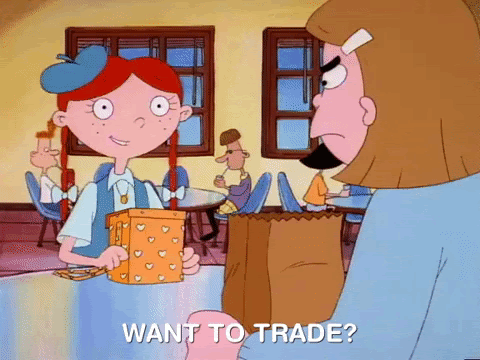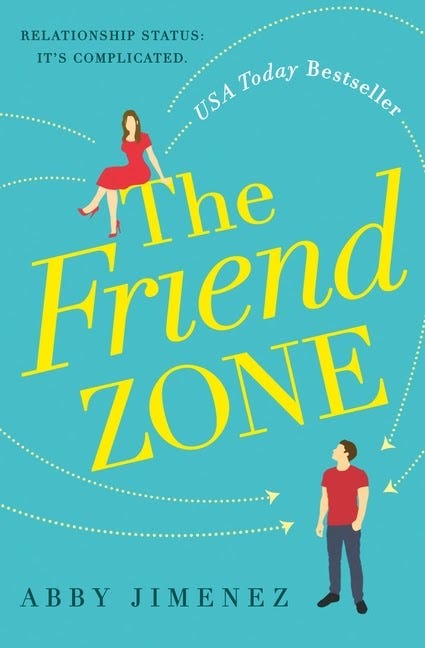Keys to a Successful Writing Swap
Sending your work to a fellow writer for feedback? Keep these tips in mind.
If you’ve been reading this newsletter for a while, you know by now that I identify as what author Gretchen Rubin would call an “obliger.” That means I thrive on accountability. I love a hard deadline or daily word count goal. Anything to stretch me out of my comfort zone and help me set aside my fear of writing poorly.
So it should come as no surprise that I regularly meet up with a few of my writer friends to talk about our work. These writing swaps pull me out of my lonely depths while also making my work better. Win-win!
When I spoke with author Chelsea Hodson last year about accountability, she shared the following wisdom:
All you need is one reliable person that wants to work at a similar rate that you do. Ideally, you admire this person in some way and don't want to let them down. I would recommend setting up the constraints (do you email each other every day? every week? for how long?) and beginning as soon as possible. Procrastination is fear, and the only way to overcome that is to face it immediately.
Great advice! An accountability partner really helps me shove myself out of my procrastination habit. Here are some tips for fostering a relationship with a writing swap buddy.
Find your swap buddy (or buddies).
I find it best to swap with a writer who’s working within a similar form as I am because we can have in-depth conversations about the challenges of the form itself. For instance, if you’re working on a novel, I recommend seeking out a fellow novelist; if you’re a poet, aim for poets.
There’s no reason why you have to keep your swaps to one person. I know a lot of writers who’ve had success with larger writing groups. I personally like my writing swaps to be one-on-one, but that’s generally how I like to spend my social time anyway. You do you!
Since few people like to dive right into something with no clear ending, I recommend proposing your swap on a trial basis. You don’t have to describe it as such, but you could propose the terms of the swap along with your goals. Say you were writing a screenplay and had a goal to finish your first draft by the end of the summer. You could tell your swap buddy what you’re trying to do and add, “I’d like someone to hold me accountable and give me feedback on my scenes so I can meet my summer goal. Would you like to swap work every other week for the next three months and meet up to talk about it?”
Set your dates and swap terms.
When you go to schedule a writing swap, you’ll need to set two dates— one deadline to swap work and a later date to meet and discuss your work. I recommend swapping work via email a week before you meet. That way, you’ll each have plenty of time to read each other’s work, but not so much time that the work won’t be fresh by the time you meet.
Everyone likes to know what’s expected of them. That’s why I think it’s important to give your swap buddy an idea of the following:
How many pages you’d like to send at a time. To keep things fair, make sure it’s around the same number of pages you’re willing to read in return.
What kind of feedback you’d like to receive and provide in return. Line edits? A written letter? Just discussion in person or on the phone? Make it known.
Remember that swaps are a tool, not a requirement.
If you’re like me and often find yourself drifting into people-pleasing territory, keep an eye out for that behavior while you’re planning and executing your writing swaps. Sometimes I’ll get going in a swap relationship and notice myself writing for that person instead of for myself. But if you’re not into what you’re working on, chances are the person you’re swapping with won’t be into it either. That’s when I know I need to take a step back from swapping and keep my cards close to my chest for a while so I can re-center and get a feel for what I want to be writing.
Got a question about writing swaps or a tip for fellow writers planning their own? Leave a comment on this issue and I’ll chime in!
What do you find most valuable about swapping your work with a fellow writer?
“I find it valuable when it’s with a long-term critique partner who knows my goals and has a similar work ethic/set of ideals. A solid critique partner of several years knows all my bad habits and can encourage me to the point of breakthrough in a way that a new CP cannot.” —Jessica
“I enjoy the validation I get from swapping work with a trusted writer. I feel useful to another person’s project, which is validating. Then, the feedback I receive gives me confirmation that I’m on the right track with my own endeavors or at least some insight on how to get on the right track.” —Emeral
“The work swap is usually the first time I offer a scene, sketch, or story to a reader. As such, it’s a test flight—a step in development that’s important for both ironing out kinks and building the confidence to move forward. For years I wrote in an isolated vacuum. I now have a trusted work-swap partner with whom I meet regularly—every six weeks or so. Having a deadline improves production, to be sure. And having a partnership with another writer improves my energy level and my sense of connection to the writing world.” —Laura
I want to hear about your writing process! Answer some questions in my reader questionnaire and I may include your response in a future issue.
Really Digging This
Here’s what I’ve been reading and loving lately.
The Premonition — I absolutely love the movies adapted from Michael Lewis’ bestselling nonfiction books, especially The Big Short. That’s why I’m surprised that his brand new book, The Premonition, is the first I’ve read by him. I learned about this book on 60 Minutes a couple weeks ago (and yes, I am aware that that fact makes me roughly 100 years old). After hearing the real-life subjects from Lewis’ books talk about the story themselves, I immediately ordered it. Now, I’m eager to read everything he’s ever written. He’s a master of turning real people into characters and spinning boring-seeming subject matter into riveting, thought-provoking narratives.
If you’re looking at the book’s subtitle, “A Pandemic Story,” and thinking, “Yeesh, I can’t possibly read another word about COVID,” think again! This book dives deep into the processes behind the U.S. government’s formation of pandemic preparedness policies years before COVID was a blip on the radar. Completely fascinating stuff.
The Friend Zone — If you live here in Florida, you’ve probably already started hitting the beach every weekend, and chances are, you’re looking for the perfect beach read. I got you covered. Or rather, Abby Jimenez has you covered.
In The Friend Zone, Jimenez’s characters are some of the most charming I’ve ever met. Case in point: the protagonist, Kristen, spends much of the book complaining about being hangry, and I love her for it. This novel also covers themes of infertility and grief, so if you’re a fan of romances that make you think and feel beyond the steamy bits, you’ll love this novel. I just found out that the book is part of a series, so you already know what I’ll be tossing in my beach bag later this summer!
I love creeping on people’s reading lives. If you’re into that sort of thing, too, follow me on Goodreads.
Tell me about your lonely victories.
“I outlined the major revisions and additions I need to make to complete the second edit of my novel. It’s still very daunting but having a road map makes it seem more possible now!” —Chelsea
I want to hear about your writing achievements, too! Answer my reader questionnaire and I may include your response in future issues of the newsletter.
Lonely Victories is a labor of love. You can support my work by taking a workshop with me, shopping my Bookshop.org affiliate page, or tipping me for coffee.
Special thanks to Becca Wucker for editing this issue and to Aysha Miskin for designing the Lonely Victories banner.
“Writing alone can give you a very deep sense of satisfaction and lonely victory.” —Greta Gerwig











